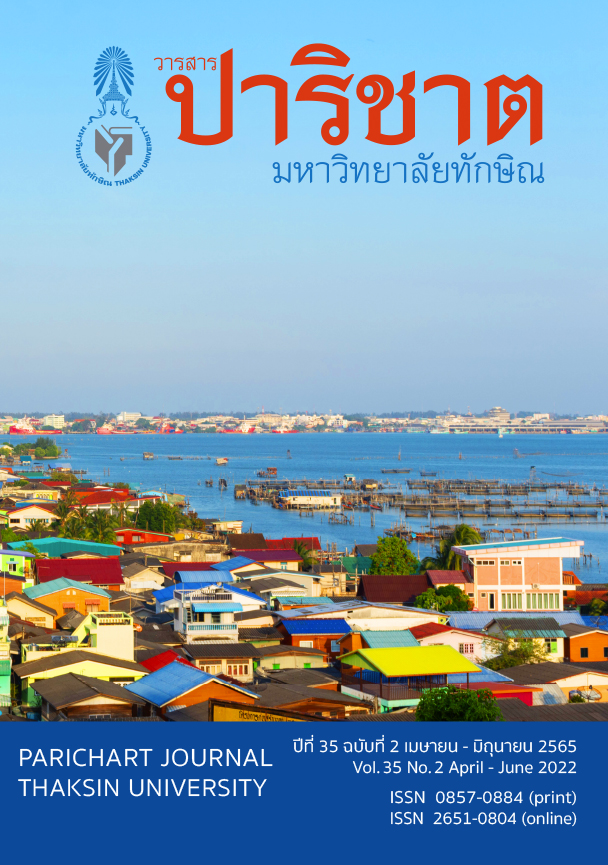Waste management process of Nan municipality under the concept of zero waste society
Main Article Content
Abstract
A study of waste management process of Nan municipality under the concept of zero waste society in Nan province used the qualitative methodology and collected data from the interview, the survey, and the observation without participation among the informants such as the administrative and performance sectors, government sector, entrepreneur, and household. The incidents and contents were analyzed. From the study found that the Nan municipality had the process of waste management following the criteria and had got a reward guaranteed from many institutes. The Nan municipality had been a model of learning area for solving the waste problem systematically and reduced the effects in time because of the full operation along with the adaptation of people behavior. In addition, the process performed in a whole sector caused a wide area participation under the method of waste management ang 3Rs (Reduce, Reuse, and Recycle) for initially decreasing the waste. This process originated the social innovation for developing the people life quality, for example, Merit and Waste foundation, volunteer group, price measure and incentive, and the waste management legislation with strict participation and social responsibility. The result showed that The waste from municipality about 30 tons/day had been classified before trade and transformation for more values about 70% and the rest (30%) were landfilled to reduce the environmental effects and decrease the cost of removal. The Nan municipality would become the zero-waste society, if a burning method was replaced absolutely by a landfill. This process required the participation of municipality and people to develop the social innovation combining with the transformative technology and the zero waste reuse for being the zero-waste society.
Article Details

This work is licensed under a Creative Commons Attribution-NonCommercial-NoDerivatives 4.0 International License.
References
Pollution Control Department. (2017). Environmental quality situation in Thailand 2020”. https://www.pcd.go.th. (in Thai)
Pollution control Department. (2017). 20 Year Pollution Management Strategy and Pollution Management Plan 2017-2012. http:22www.pcd.go.th. (in Thai)
Waste and Hazardous Substance Management Bureau. (2016). National Solid Waste Management Master Plan (2016-2021). Active Print Co., Ltd. (in Thai)
Srisatit, T. (2014). Community solid waste management engineering. Bangkok: Chulalongkorn University Press. (in Thai)
Wanaphruek, P. (2012). The improvement of the solid waste management policy of Thailand. [Unpublished doctoral dissertation]. Prince of Songkla University. (in Thai)
Zaman, A. U., & Lehmann, S. (2011). Urban growth and waste management optimization towards “Zero Waste City”. Journal City, Culture and Society. 2(4), 177-187.
Nan Municipality. (2018, December 25). Four-year local development plan (2018-2021). http://www.nancity.go.th. (in Thai)
Zaman, A. U., (2014). Roadmap towards Zero Waste Cities. International Journal of Waste https://www.researchgate.net/publication/290154191.
Chen, H. W. & Houng, H. (2004). Toward a zero waste society in Taiwan. WIT Transactions on Ecology and the Environment. 78, 509-518. (in Thai)
Fatemi, M. N. (2009). Towards zero waste strategies: Practices and challenges of household waste management in Dhaka. In Proceedings of the International Conference on Solid Waste Management Technical, Environmental and Socio-economical Contexts – Waste Safe 2009. 185-192. 9-10 November 2009, Khulna, Bangladesh. Bangladesh: Khulna University. (in Thai)
Eric, L., & Kate, B. (2015). How you Community Can be Zero waste in 10 years. Bio Cycle; Emmaus. 56(10), 16-19.
Wongchummali, P., Premprasit, R. (2017). Zero waste: Concept and principle going to a waste-free society. In The 16th Graduate Student Network Seminar Department of Sociology and Anthropology. 915-929. June 29-30, 2017, Muang, Phitsanulok. Phitsanulok: Naresuan University. (in Thai)
Tantiwatsadakan, C. (2016). Low-carbon society when Kamikatsu, the city without waste center of green Economy Research. Thammasat University. (in Thai)


